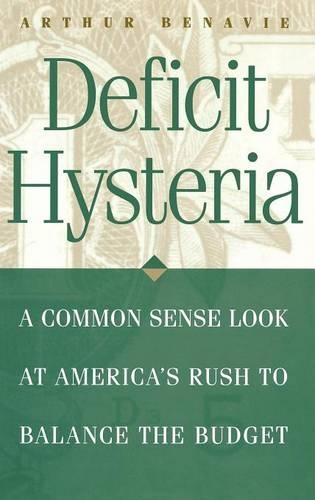
Deficit Hysteria: A Common Sense Look at America's Rush to Balance the Budget
(Hardback)
Publishing Details
Deficit Hysteria: A Common Sense Look at America's Rush to Balance the Budget
By (Author) Arthur Benavie
Bloomsbury Publishing PLC
Praeger Publishers Inc
30th September 1998
United States
Classifications
Tertiary Education
Non Fiction
Public finance and taxation
Economic theory and philosophy
336.973
Physical Properties
Hardback
168
Description
The political consensus in the United States today is that the nation avoid deficit spending. But as virtuous and unassailable as that goal sounds, it has fallacies and dangers. In a lucid, nontechnical writing style, Benavie shows that deficits can be either good or bad and explains how to tell the difference. Deficits, or government borrowing, can be beneficial or harmful depending on what the government does with the money. Preventing such borrowing, Benavie points out, would be comparable to preventing one's family from borrowing money to buy a house or to put a child through college. Deficits can be beneficial to the nation's economic health in three main ways. When the economy slumps, a deficit, which is automatically created, helps to reduce the severity of the recession. When the economy is seriously depressed, boosting the deficit may be the only cure. Finally, deficits to support such investments as basic research, cleaning up toxic waste, and rebuilding inner cities are crucial to the economic health of future generations.
Reviews
"Clear, compelling and comprehensive! A magnificent antidote to the Deficit Hysteria it deplores. A must and interesting reading for those who are ready for reason."-Robert Eisner William R. Kenan Professor Emeritus Northwestern University
"Deficit Hysteria is a badly needed book. In the clearest and simplest prose, Arthur Benavie explains why the word 'deficit' sends chills up our national spine, and he shows us how we can get rid of those chills by learning what deficits are--and are not. I wish this book could be made compulsory reading for every Congressman. In the meanwhile, I recommend it as enormously worthwhile reading for every voter."-Robert Heilbroner Professor Emeritus New School for Social Research
"So you thought the deficit war was over Arthur Benavie raises questions which few people are asking these days. Whether or not you agree with him, this readable little book contains a treasure trove of information. The myths and shibboleths fall like toy soldiers."-Alan S. Blinder Gordon S. Rentschler Memorial Professor of Economics Princeton University
[A] direct, clear, and level-headed analysis of the macroeconomics of federal budget deficits....Benavie does not intend to break new ground but rather to present sound economic logic for intelligent general readers, explaining why mainstream macroeconomists have not been hugely worried about balanced federal budgets, and he succeeds....Recommended for undergraduate students and general readers.-Choice
"A direct, clear, and level-headed analysis of the macroeconomics of federal budget deficits....Benavie does not intend to break new ground but rather to present sound economic logic for intelligent general readers, explaining why mainstream macroeconomists have not been hugely worried about balanced federal budgets, and he succeeds....Recommended for undergraduate students and general readers."-Choice
"[A] direct, clear, and level-headed analysis of the macroeconomics of federal budget deficits....Benavie does not intend to break new ground but rather to present sound economic logic for intelligent general readers, explaining why mainstream macroeconomists have not been hugely worried about balanced federal budgets, and he succeeds....Recommended for undergraduate students and general readers."-Choice
Author Bio
ARTHUR BENAVIE is Professor of Economics at the University of North Carolina at Chapel Hill./e His specialty is macroeconomics, a field which includes the topic of government deficits. He has published numerous journal articles and two books for economists.
